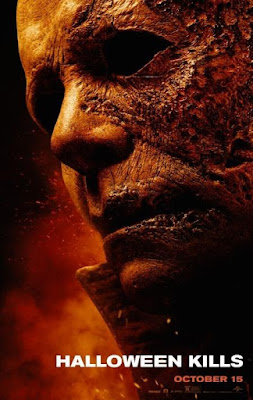This is truly a Michael Myers film for the Biden years. The chaos we watched unfold in the Kabul airport and the anarchy we try to ignore every day at the border has come to Haddonfield. It is Halloween, 2018. Myers has survived Laurie Strode’s death trap and is killing people with impunity. Sheriff Barker is powerless to stop him and incapable of restoring law and order as the town slips into panic and paranoid violence. Only those who previously survived Myers’ prior attacks can hope to stop him now in David Gordon Green’s Blumhouse-produced Halloween Kills, which opens Friday in theaters nationwide.
The action picks up immediately where Halloween 2018 left off. Strode is on her way to the hospital, believing she finally put an end to Myers once and for all. Unfortunately, at this time, he is actually hacking his way through the firemen that were dispatched to the blaze consuming Strode compound.
This being Halloween, a group of survivors from the original 1978 horror night have congregated to commemorate those who died and toast those who saved them, including Tommy Doyle and Lindsey Wallace, the kids Strode was babysitting, now all grown-up. When word reaches them of Myers’ fresh killing spree, they decide to find him and kill themselves. Obviously, it is easier said than done, but Doyle turns out to be a good recruiter for vigilante patrols. Of course, Strode is convinced he is coming for her, but her granddaughter isn’t so sure.
In some ways, Halloween 2018 would have made a really satisfying conclusion to the franchise, having retconned the other inferior sequels and reboots into the stuff of fake news and urban legend. However, it probably was unrealistic to think it would be so easy to kill off a bogeyman like Myers. Unfortunately, Halloween Kills is conspicuously a middle film that obviously sets up the already-announced third movie in the sequel trilogy, so there is not a heck a lot of closure when the credits roll.
On the other hand, Kill continues to echo the 1978 film in ways that deepen the tragic resonance of the Michael Myers mythos. The return of his survivors is more than just fan service (but it is that too, especially Kyle Richards reprising her old role as Lindsey and Charles Cyphers making his first film appearance since 2007 as Sheriff Leigh Brackett, now a security guard at the hospital—and they are both quite good). Rather, their reappearance personifies the degree to which the community remains traumatized by Myers’s crimes, even forty years later.
Jamie Lee Curtis and Will Patton are both dependable as ever playing Strode and Officer Hawkins, but since both are largely sidelined from the film due to serious injuries suffered they in the previous film, a good deal of the load falls on Anthony Michael Hall, who is really terrific as Doyle. It is a gritty tormented performance that gives the film depth and a real edge.
Kills happens to be more violent than its predecessor and messier in every sense. It is also massively zeitgeisty. As we know from post-modernism and Room 237, the very notion of authorial intent is a fiction. It does not matter whether Green and co-screenwriters Scott Teems and Danny McBride intended the film to be a commentary on the Biden administration. It still reflects the lawless bedlam of the last year.
Like it or not, Sheriff Barker helplessly flailing amid the
maelstrom of the Haddonfield Hospital riot definitely parallels Biden’s
impotency and incompetency. It is a horrifying scene that condemns our basest fears and animal instincts,
but the abject confusion and mob rule also eerily (and inadvertently) parallels
real-life scenes that have unfolded on our streets and borders. The question is whether Barker will surrender
the “forever war” against Michael Myers. Who knew Haddonfield, IL was the “graveyard
of empires?” It is probably best to withdraw from the town entirely and just
maintain over-the-horizon surveillance on Myers’ old house of horrors.
Unlike Rob Zombie’s mismanagement of the Halloween franchise, Kills deepens the mythos while maintaining Myers’ status as an unexplainable, unknowable evil. In fact, it starts to lean into the notion that he is supernatural, at least to some extent. It is not that he was abused as a child or became obsessed with Strode for some reason. He just simply kills. Once again, the latest film proves anew the eerie power John Carpenter’s original music still holds. The new soundtrack credited to Carpenter, Jody Carpenter, and Daniel A. Davies, which clearly builds on Carpenter’s iconic themes, will often give fans goosebumps.
Unlike Rob Zombie’s mismanagement of the Halloween franchise, Kills deepens the mythos while maintaining Myers’ status as an unexplainable, unknowable evil. In fact, it starts to lean into the notion that he is supernatural, at least to some extent. It is not that he was abused as a child or became obsessed with Strode for some reason. He just simply kills. Once again, the latest film proves anew the eerie power John Carpenter’s original music still holds. The new soundtrack credited to Carpenter, Jody Carpenter, and Daniel A. Davies, which clearly builds on Carpenter’s iconic themes, will often give fans goosebumps.
Kills is still the second-best Halloween sequel, but the way it leaves us hanging is frustrating. Sadly, it clearly implies many of the characters and elements that worked so well this time probably will not be available for the next film. Yet, it is the Halloween of our current day and age (albeit, perhaps accidentally so). Recommended for Hall’s work and its respect for its own legend, Halloween Kills opens this Friday (10/15) at a theater near you (including the AMC Empire) and it will also stream for Peacock subscribers.

